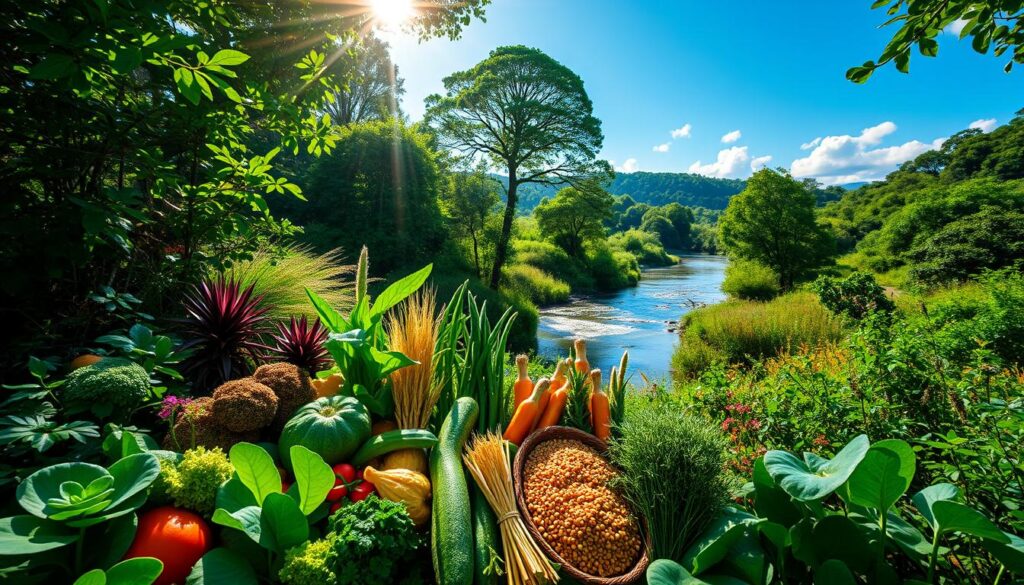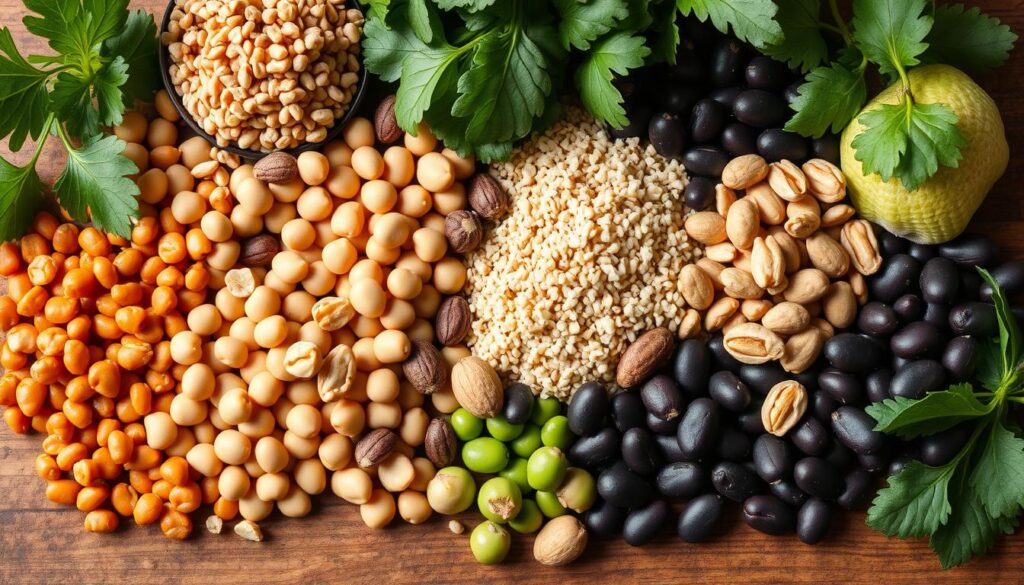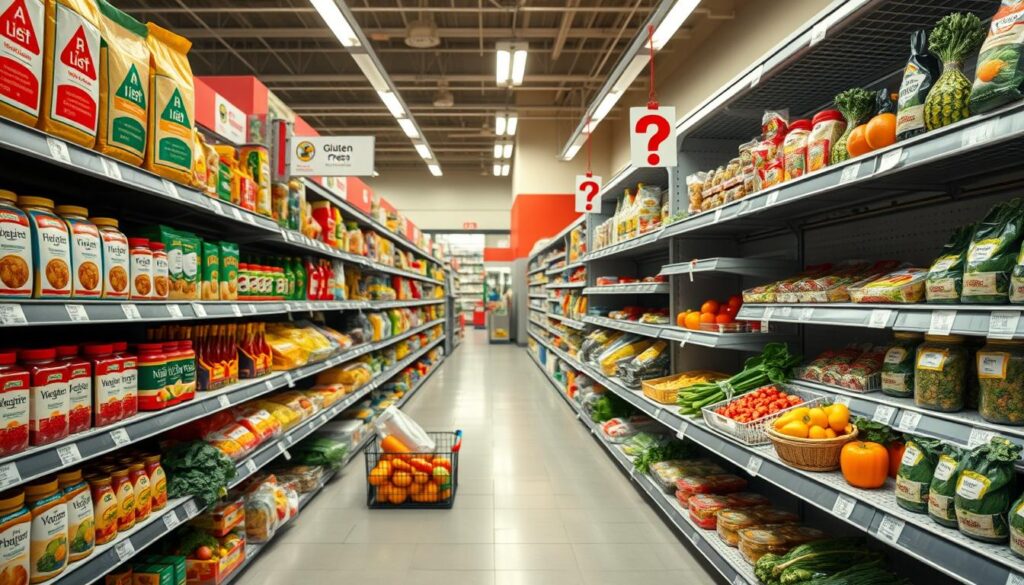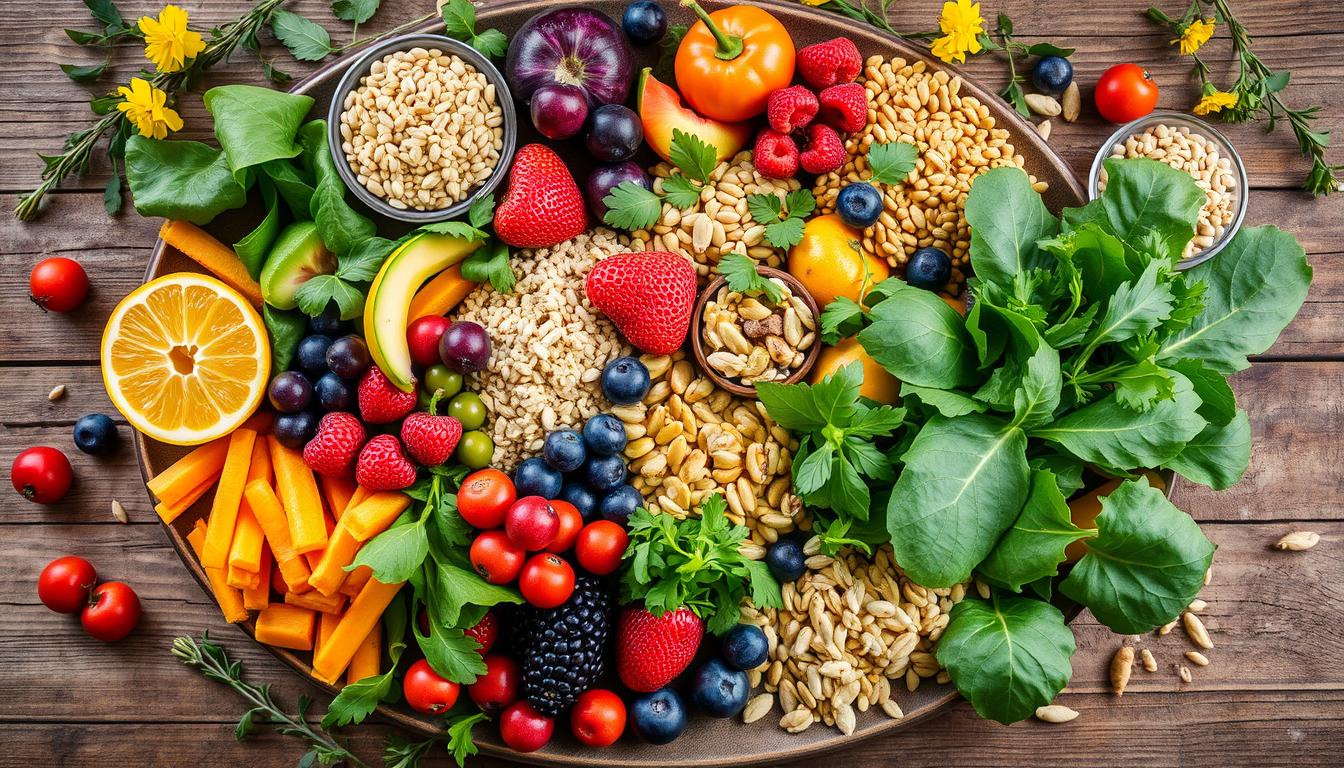Benefits of Vegan & Gluten-Free Living: Benefits of Vegan & Gluten-Free Living: Ever thought about how a vegan and gluten-free lifestyle could change your health? These diets bring many benefits, from better health to helping the planet.
These diets bring many benefits, from better health to helping the planet. This guide explores the health perks of vegan and gluten-free eating. It offers tips and advice for starting and sticking to a plant-based and gluten-free diet.
Looking to lose weight, improve heart health, or adopt the benefits of vegan & gluten-free living? This detailed guide is here to help.
Key Takeaways
- Plant-based diets are linked with lower cholesterol levels and reduced risk of type 2 diabetes.
- The benefits of vegan & gluten-free living are particularly noticeable in weight management, as both diets focus on fiber-rich foods that help you feel full longer, making weight loss more achievable.
- Gluten-free diets are essential for those with celiac disease or gluten sensitivity, impacting less than 7% of Americans.
- One-third of Americans buy gluten-free products, even though they can be more expensive than regular items.
- Nutrient-dense vegan diets can reduce the risk of chronic diseases like heart disease, diabetes, and cancer.
Understanding Vegan and Gluten-Free Diets
Benefits of vegan & gluten-free living are increasingly recognized by those seeking a healthier lifestyle. Many people are adopting these diets not only for their health benefits but also for their positive impact on the environment.
What Are the Benefits of Vegan & Gluten-Free Living?
One of the major benefits of vegan & gluten-free living is the focus on plant-based eating. A vegan diet emphasizes whole plant foods while avoiding animal products, promoting health benefits and supporting animal welfare. Foods like beans and lentils are key, providing protein and important nutrients.
People on a vegan diet often weigh less and have a lower BMI. This is because plant foods are high in fiber and low in calories. One of the key benefits of vegan & gluten-free living is the reduced risk of heart disease and certain cancers, making it a smart choice for overall health.
Why You Should Consider the Benefits of Vegan & Gluten-Free Living for Better Health
A gluten-free diet means avoiding foods with gluten, found in wheat, barley, and rye. It’s essential for those with celiac disease, affecting two million in the U.S. Symptoms include stomach problems and inflammation.
Among the many benefits of vegan & gluten-free living, going gluten-free has been shown to improve digestion and reduce inflammation, which is key for those with gluten sensitivity. It can also help with chronic bloating and joint pain. Foods like fruits, veggies, and quinoa are naturally gluten-free.
If you’re interested in both vegan and gluten-free diets, there are many recipes to try. Spanish cuisine is a great place to start, with its rich flavors and colors. For more ideas, check out this page.
Health Benefits of a Vegan Diet
One of the main benefits of vegan & gluten-free living is its role in supporting weight loss, improving heart health, and reducing the risk of chronic diseases.
It helps with weight management, improves heart health, and lowers cholesterol and blood pressure. Let’s explore these benefits in more detail:
Supports Weight Loss
One key advantage of a vegan diet for health is its role in weight management.Studies reveal one of the key benefits of vegan & gluten-free living is weight management, with vegans typically having a lower BMI compared to non-vegans. A US study found vegans lost 4.2kg more than others in 18 weeks. So, a vegan diet can be a great way to manage weight.
Improves Heart Health
A vegan diet greatly improves heart health. Male vegans see big drops in heart disease risk factors. By eating plant-based foods and avoiding animal fats, vegans lower heart disease risk. Antioxidants and fiber in vegan foods also boost heart health.
Lowers Blood Pressure and Cholesterol
A vegan diet is also great for lowering cholesterol and blood pressure. It’s a heart-healthy choice. Plant-based foods are rich in fiber and low in cholesterol, helping control blood pressure. Better insulin sensitivity and cholesterol management also reduce type 2 diabetes risk.
To sum up, a vegan diet is packed with nutrients. Here’s a comparison:
| Diet Type | Total Energy Intake | Fat Profile | Dietary Fiber Levels |
|---|---|---|---|
| Vegan | Lowest | Best | Highest |
| Omnivore | Highest | Moderate | Lowest |
| Lacto-Ovo Vegetarian | Moderate | Low | Moderate |
In conclusion, a vegan diet for health offers many benefits. It aids in weight management, improves heart health, lowers blood pressure, and manages cholesterol. Adopting a plant-based lifestyle can lead to a healthier, longer life.
Health Benefits of a Gluten-Free Diet
Benefits of Vegan & Gluten-Free Living: Switching to a gluten-free diet, especially when combined with a plant-based lifestyle, can bring numerous health benefits, such as elevated energy levels and reduced joint pain.
This is especially true for those with gluten intolerance or celiac disease. More and more people, even without these conditions, are trying it out. They’re discovering the many advantages it offers.
Elevated Energy Levels
The benefits of vegan & gluten-free living are clear when people report increased energy levels and improved digestion, showing how these diets help enhance overall vitality.
This is because their bodies no longer have to deal with gluten. It helps them absorb nutrients better and stay energized all day.
Eliminates Bloating
Getting rid of gluten can also help with bloating. For those with gluten intolerance, gluten can cause gas and bloating. By eating gluten-free, people can feel more comfortable and have better digestion.
Helps Ease Joint Pain
Gluten-free diets can also help with joint pain. Gluten can cause inflammation, which worsens joint pain and arthritis. By avoiding gluten, people can reduce this inflammation. This leads to less pain and better mobility.
It’s no surprise that up to 30% of adults in the US are trying to cut down on gluten. Whether it’s for celiac disease, gluten sensitivity, or just wanting to feel better, the gluten-free diet offers many benefits.
| Condition | Percentage Affected |
|---|---|
| Celiac Disease | 1% of the US population |
| Nonceliac Gluten Sensitivity | 0.5% – 13% |
| Adults Reducing Gluten | Up to 30% |
| US Population Preferring to Avoid Gluten | Approximately one-third |
10 Surprising Benefits of Eating Vegan and Gluten-Free for Your Health and the Environment
Benefits of Vegan & Gluten-Free Living: Choosing a vegan and gluten-free lifestyle not only improves your health but also helps the environment, reducing your carbon footprint and conserving water.It improves your health and helps the environment. Let’s look at some of these surprising advantages.

One big health benefit is better weight management. Vegans often weigh 10 to 20 pounds less than meat-eaters. Vegan diets can lead to more weight loss than diets recommended by health experts.
The environmental benefits are also huge. Eating less meat means using less land, water, and energy. This helps reduce our carbon footprint and protects our ecosystem.
Going vegan also boosts heart health and lowers disease risk. Animal products can increase heart disease and diabetes risk. But vegan diets can greatly reduce these risks. Even men with early-stage prostate cancer may see their disease stop or reverse with a vegan diet.
Animal welfare is another reason people choose veganism. Many believe in animal rights and value. This choice helps animals and supports sustainable living.
Vegans often have clearer skin and less body odor. This is due to the nutrients in plant-based foods. These foods help reduce toxins and improve skin health.
Longevity is another benefit. Vegans and vegetarians may live three to six years longer. This is because they have a lower BMI and less body fat.
In summary, vegan and gluten-free living is great for your health and the planet. It supports heart health and reduces resource use. Choosing this lifestyle is a commendable choice.
Managing Diabetes with Vegan and Gluten-Free Diets
Benefits of Vegan & Gluten-Free Living: Living with diabetes can be tough, but incorporating a vegan and gluten-free diet can significantly help in managing blood sugar levels and reducing complications.
They keep blood sugar levels stable and lower the chance of serious problems. These diets focus on eating plant-based and gluten-free foods, which is good for controlling diabetes.
Supports Blood Sugar Balance
Vegan and gluten-free diets are great for keeping blood sugar in check. Studies show that people who eat more plants have less type 2 diabetes. Vegans, in particular, have half the diabetes rate of non-vegetarians.
This is because plant foods are full of fiber. Fiber helps slow down how quickly sugar is absorbed, which keeps blood sugar from spiking.
Research found that those who ate more plant-based foods had a 34% lower risk of diabetes.
Gluten-free diets also help with blood sugar, especially for those with diabetes and celiac disease. While some gluten-free foods have more sugar, eating whole foods like quinoa and millet helps manage blood sugar well.
Reduces Risk of Diabetes Complications
In the U.S., diabetes costs the healthcare system $176 billion each year. It leads to serious problems like heart attacks and kidney failure in older adults. But, a vegan and gluten-free diet can lower these risks.
- Vegan diets help keep blood sugar under control, as shown by lower hemoglobin A1C levels.
- Gluten-free diets, when done right, can also lower the risk of diseases like celiac, common in type 1 diabetes patients.
By choosing a vegan and gluten-free diet, people with diabetes can better control their blood sugar. This not only reduces the risk of serious problems but also improves their overall quality of life. It’s a long-term solution that promotes health and well-being.
Environmental Benefits of Vegan and Gluten-Free Lifestyles
One of the most significant benefits of vegan & gluten-free living is its positive environmental impact, helping reduce carbon footprints and conserve water. It helps us reduce carbon footprint and conserve water. This leads to a better future for all.
Reducing Carbon Footprint
Adopting a plant-based diet is a big step towards reducing our environmental impact. Studies show that a vegetarian diet can cut carbon footprint by up to 50%. This is because plant-based foods need less resources to grow than animal products.
For example, making meat, especially beef, uses a lot of energy and releases a lot of greenhouse gases.
| Type of Diet | Average Carbon Emissions (kg CO2e per year) |
|---|---|
| Omnivorous Diet | 3,000 |
| Vegetarian Diet | 1,500 |
| Vegan Diet | 1,000 |
Conserving Water
A vegan and gluten-free lifestyle also helps save water. Meat production uses a lot of water; it takes about 2,500 gallons to make one pound of beef. Plant-based foods use much less water, making them a better choice.
Water is saved from growing crops to processing. Choosing fruits, vegetables, and legumes over meat is a big water saver.
Our diet choices matter a lot. By choosing vegan and gluten-free, we help our health and the planet’s health.
Improving Gut Health with Plant-Based Foods
Eating a diet full of plant-based foods can really help your vegan gut health. Everyone has a unique mix of gut bacteria, shaped by things like how they were born and what they ate as babies. Eating foods rich in prebiotics and probiotics can help grow the good bacteria in your gut.
A healthy gut can lower the risk of serious diseases like heart disease and cancer. Foods like sauerkraut, kimchi, and yogurt are full of probiotics. They help keep your gut bacteria in balance and boost your immune system. For example, one cup of sauerkraut has 4 grams of fiber.
Also, a plant-based diet adds prebiotics like galactooligosaccharides and inulin. These foods feed the good bacteria in your gut. Experts say to aim for 30 grams of fiber a day to keep your gut healthy.
| Food | Fiber Content Per Cup | Prebiotic Specifics |
|---|---|---|
| Jerusalem Artichokes | 2.4g | High in inulin |
| Leeks | 1.6g | Rich in fructans |
| Onions | Varies | Rich in inulin, fructans, and fructooligosaccharides |
Plant-based diets can also lower the risk of Type 2 Diabetes and heart disease by 20-25%. Sadly, 6 out of 10 Australians don’t get enough fiber. Adding foods like lentils and black beans can help increase fiber and improve gut health.
Mixing up your food can keep your diet interesting. Try combining whole grains like quinoa with veggies and snacking on nuts and seeds. Foods high in resistant starch, like potato salad, also help your gut. By eating these foods, you can keep your digestive system healthy and happy!
Essential Nutrients in a Vegan & Gluten-Free Diet
Following a vegan and gluten-free diet can be tough but rewarding. It’s key to know where to find important nutrients like protein, essential fatty acids, vitamin B12, and iron. This helps keep your diet balanced and healthy.
Sources of Protein
Protein is crucial for muscle repair and growth. Luckily, there are many vegan and gluten-free protein sources. Here are a few:
- Soy products like tofu and edamame
- Seitan (made from gluten if you are not sensitive)
- Legumes such as chickpeas and lentils
- Nutritional yeast, which can be added to dishes for a cheesy flavor
Essential Fatty Acids
Essential fatty acids are important for brain health and overall well-being. To add these to your diet, try these options:
- Whole grains such as quinoa and brown rice
- Leafy green vegetables like spinach and kale
- Unsalted nuts and seeds, including almonds, walnuts, and chia seeds

Vitamin B12 and Iron
Vitamin B12 and iron are often missing in vegan diets. They need special care. Iron can be found in:
- Black-eyed peas
- Tofu
- Dried fruits like apricots and raisins
Vitamin B12 requires supplements or fortified foods like nutritional yeast and plant-based milks. Most adults need about 2.4 micrograms daily. Making sure you get these nutrients helps avoid deficiencies and keeps you full of energy.
Here’s a quick look at vegan protein and essential fatty acid sources:
| Source | Protein | Essential Fatty Acids |
|---|---|---|
| Soy Products (Tofu, Edamame) | Yes | No |
| Lentils and Chickpeas | Yes | No |
| Nuts (Almonds, Walnuts) | No | Yes |
| Whole Grains (Quinoa, Brown Rice) | No | Yes |
By adding these nutrient-rich foods to your meals, you can enjoy the health benefits of a vegan and gluten-free diet. You’ll also make sure your body gets the nutrients it needs.
Supporting Healthy Skin
Vegan and gluten-free diets are great for your skin. They help you stay healthy and look radiant. These diets are full of nutrients that fight inflammation and improve skin conditions.
Benefits for Skin Conditions
Diets rich in inflammation can worsen acne and psoriasis. Vegan and gluten-free diets, however, are packed with anti-inflammatory foods. For example, walnuts have omega-3 and omega-6 fatty acids that fight inflammation.
Red bell peppers are also good for your skin. They’re full of vitamin C, which helps make collagen and reduce wrinkles.
Women who ate high-antioxidant cocoa powder saw better skin health in 6-12 weeks. They had more hydrated skin, less roughness, and less sensitivity to burning.
Sunflower seeds are another great choice. They’re full of vitamin E, which fights free radicals. Foods like kale and avocados are also key in a vegan diet. They help reduce flare-ups and make your skin look smoother and brighter.
Anti-Inflammatory Effects
A vegan and gluten-free diet is anti-inflammatory. Foods like oats, green tea, and broccoli can lower inflammation markers. Oats are full of nutrients and antioxidants that clean your skin naturally.
Green tea boosts blood flow and oxygen to your skin, giving it a natural glow. Broccoli protects your skin from damage with its sulforaphane and lutein. Soy products also improve skin elasticity and reduce wrinkles.
| Vegetable/Food | Key Nutrient | Skin Benefit |
|---|---|---|
| Walnuts | Omega-3 and Omega-6 | Reduces inflammation, strengthens skin structure |
| Red Bell Peppers | Vitamin C | Boosts collagen, reduces wrinkles |
| Sunflower Seeds | Vitamin E | Combats free radicals |
| Kale | Beta-carotene, Polyphenols | Antioxidant-rich for skin health |
| Green Tea | Catechins | Enhances blood flow to skin |
| Broccoli | Sulforaphane, Lutein | Anti-aging, protects against damage |
Adding these foods to your diet can greatly improve your skin. A vegan and gluten-free diet is anti-inflammatory. It leads to healthier, more vibrant skin.
Challenges of a Vegan & Gluten-Free Diet and How to Overcome Them

Starting and keeping up with vegan and gluten-free diets can be rewarding. But, it also comes with its own set of challenges. Knowing these challenges and how to beat them will help you stay on track and enjoy the benefits of this lifestyle.
Nutrient Deficiencies: One big challenge is making sure you get all the nutrients you need. Vegans might find it hard to get enough protein, vitamin B12, and iron. Gluten-free folks might miss out on vitamins and minerals found in whole grains.
- Protein sources: Try plant-based foods like lentils, chickpeas, quinoa, and tofu.
- Vitamin B12: Look for fortified foods or take supplements.
- Iron: Eat spinach, beans, and lentils with foods high in vitamin C to help your body absorb iron better.
Going out to eat or joining social events can be tough. Many places don’t have vegan and gluten-free options, making it hard to stick to your diet.
“When dining out, research menus in advance and call ahead to ensure there are accommodating options. Suggest potlucks where you can bring your own vegan and gluten-free dish to share.”
Gluten-free versions of foods can be very expensive. For example, gluten-free muffins or cereal might cost up to 242 percent more than regular ones. This can be a big financial hurdle for many.
- Buy in bulk: Get staples like rice, beans, and lentils in big quantities to save money.
- Choose whole foods: Foods like fruits and vegetables are often cheaper and healthier.
Not all gluten-free products are healthy. Some may have more sugar, fat, and unhealthy fillers. This can lead to weight gain and other health problems.
A study found that avoiding gluten might increase the risk of heart disease because of higher arsenic levels in rice. To avoid this, try different grains and include gluten-free options like quinoa, millet, or amaranth.
By understanding and tackling these challenges, you can overcome dietary hurdles and support your health in the long run. Being informed and proactive will help you enjoy a balanced and nutritious lifestyle.
Boosting Creativity and Discovering New Foods
Trying vegan and gluten-free diets can spark your creativity in the kitchen. It leads to finding new flavors and ingredients. This journey makes eating a fun adventure. Let’s explore some creative cooking ideas and new ingredients to improve your cooking skills!
Creative Recipes Ideas
Start by adding unique ideas to your meals. Here are a few ideas to spark your creativity:
- Chickpea Salad Wraps: Chickpeas are packed with 21g of protein per 100g, making them a great choice for a tasty salad wrap.
- Nectarine Smoothie Bowl: Nectarines are full of Vitamin C and A, making a refreshing and healthy base for a vibrant smoothie bowl.
- Brussels Sprouts Tacos: Brussels sprouts are not just tasty but also have anti-inflammatory properties and are low in calories, perfect for tacos.
Exploring Alternative Ingredients
Trying new ingredients can turn simple dishes into amazing meals. Avocados, for example, are not just nutritious. They also add a creamy texture to dishes.
| Ingredient | Benefits |
|---|---|
| Pistachios | Rich in protein, fiber, vitamins, and minerals, these “drupes” boost overall nutrition. |
| Dark Chocolate | Helps lower blood pressure and reduce inflammation, revealing a sweet level of health benefits as per Harvard studies. |
| Almonds | Contain 28g of protein per 100g, rivaling the protein content of steak. |
Exploring new ingredients leads to healthier and more exciting meals. For a detailed guide on transitioning to a balanced vegan diet and meal planning tips, check out this resource on creating balanced vegan meals.
By embracing these ideas and ingredients, you can enjoy a varied and flavorful vegan and gluten-free diet.
Conclusion
In conclusion, adopting the benefits of vegan & gluten-free living can improve your health, boost energy levels, and help protect the environment, making it a smart and sustainable choice.
It can improve your health, like helping with weight loss and heart health. It also boosts energy and reduces joint pain.
These diets are good for the planet too. They help lower carbon footprints and save water. This makes them even more appealing.
For people with diabetes, vegan and gluten-free diets can help control blood sugar. They also offer a chance to cook in a sustainable way. This way, we can get important nutrients from foods like seitan and soy milk.
While starting a vegan and gluten-free diet can be tough, it’s doable. With the right knowledge and creativity, we can enjoy delicious meals. This guide aims to help you adopt healthier eating habits for a better future.

